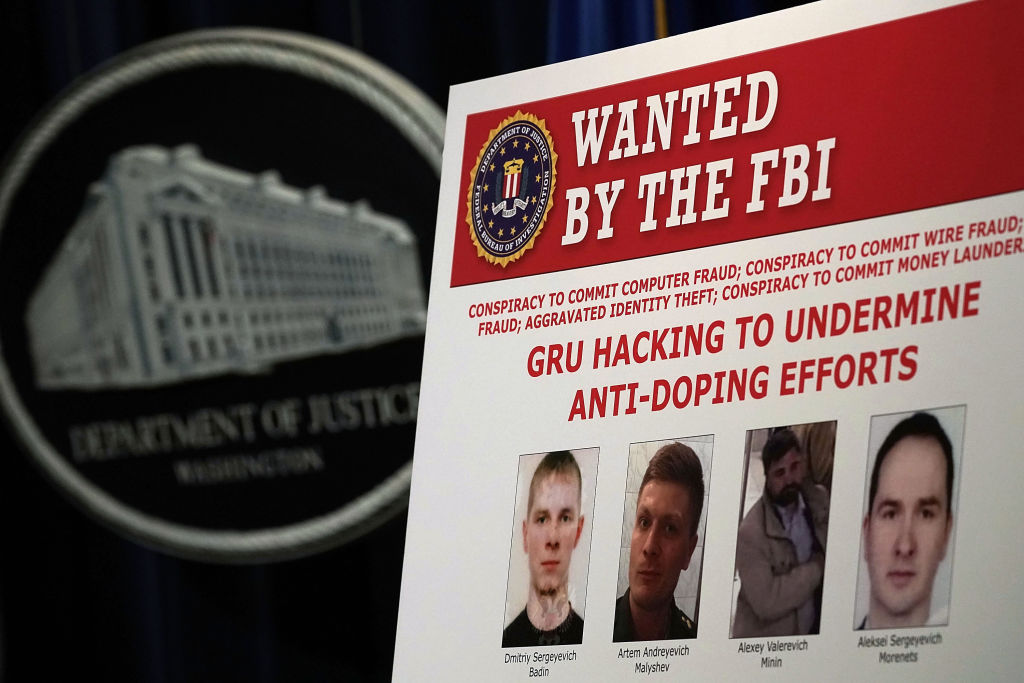But it may now have overstretched itself. The GRU has been accused of plotting to hack into the Organisation for the Prohibition of Chemical Weapons (OPCW), which had been investigating the Salisbury attack. Earlier this year, the US Department of Justice (DoJ) indicted seven Russian GRU spies on hacking charges related to leaking Olympic athletes’ drug-test information; GRU operatives have also been indicted in relation to the US presidential election hacks. And the Canadians have confirmed that breaches at the Montreal-based World Anti-Doping Agency were probably carried out by Russian intelligence. So many GRU operatives are now being named that its personnel are in danger of becoming the best known secret agents on the planet.
The GRU is much broader and has a greater licence to operate than Britain’s intelligence agencies. GRU spooks get their hands dirty, performing tasks ranging from coups to ‘wet jobs’ (state assassinations); but they also understand cyber operations.
The Ukraine war gave the GRU its chance to re-establish itself. It was a war ideally suited to the agency’s ability to conduct a broad spectrum of operations, ranging from fermenting violence, staging popular protests, cyber work, infiltration and subversion. Above all, the Crimean annexation operation demonstrated that the GRU could conduct a subtle and politically-nuanced pattern of espionage.
Elsewhere, too, the GRU has been one of the weapons in the Kremlin’s new conflict with the West. In this fight, much of the inspiration appears to come from GRU colonel Vladimir Kvachkov. Almost unknown in the west, Kvachkov is said to be highly influential in Russia’s specialist military culture. Nato’s handbook of Russian Information Warfare suggests as much, claiming that Kvachkov’s theory of special operations ‘has reportedly been adopted as the basis for Russian military instructional and training materials’.
In his Special Forces of Russia, published in 2004, three years before Putin publicly broke with the West, Kvachkov argued that Russia had been too focused on conventional military victory and had failed to understand the political nature of war. Victory in war, he said, should be defined in terms of the political end-state, not just victory in battle. He argued that the role of special forces should be in supporting flexible, deep operations that prevented the enemy from joining the fight effectively – just the sort of operation exposed by the Dutch secret services this week. This echoes the Chinese military philosopher Sun Tsu’s maxim to defeat your enemy before he or she is aware of it. The style of conflict envisaged by Kvachkov is very much that now used by Russia, and which the UK and other major Western nations are still struggling to understand.
But all may not be well with the GRU. As we now know, the agency failed to hack the OPCW Chemical Weapons watchdog, failed to poison Sergei Skripal and failed in the botched Montenegro Coup in October 2016. The Russians have a saying – ni krasivi, no effektivno – not pretty, but effective. If the GRU’s work is now not only not pretty but also not effective, then there’s a problem for the agency.
It is sometimes said of special forces that they are ‘plumbers who think they are electricians’. I wonder if Russia’s other spy agencies, such as the FSB and SVR, are privately saying to president Putin that the GRU’s ‘plumbers’ are putting at risk the longer-term subversive activities of other Russian agencies. The GRU may yet wish its operatives had stayed in the shadows.
Bob Seely is MP for the Isle of Wight. He sits on Parliament’s Foreign Affairs Committee and writes on military strategy






Comments